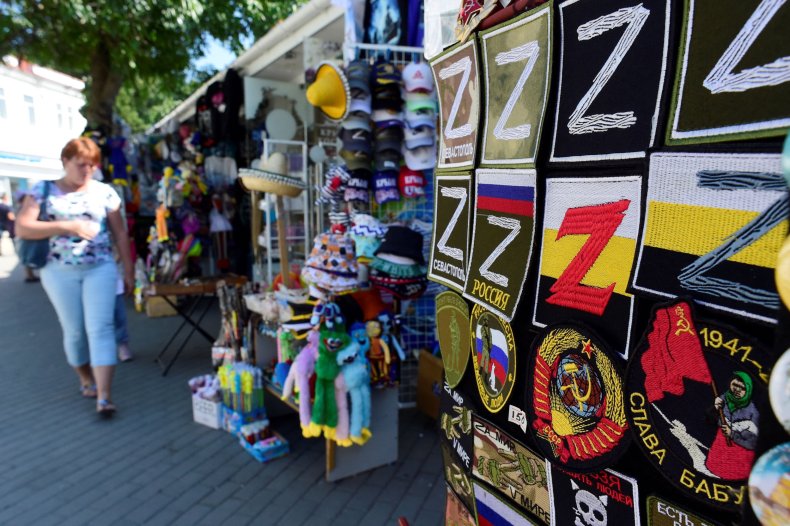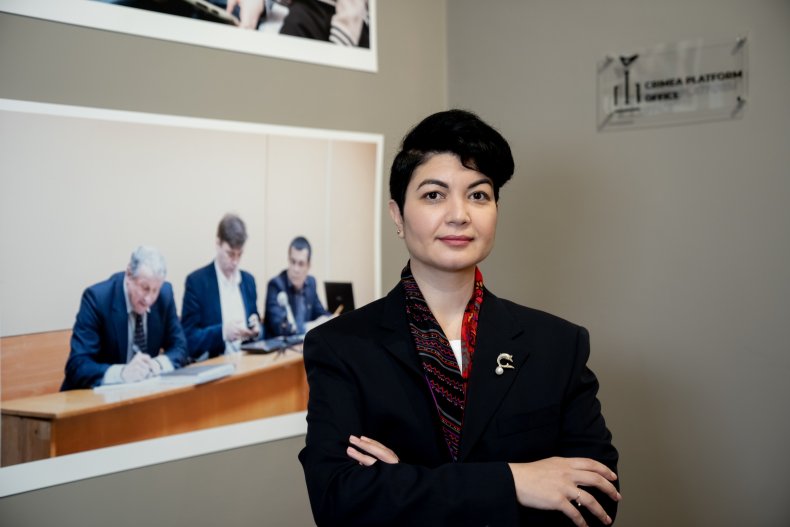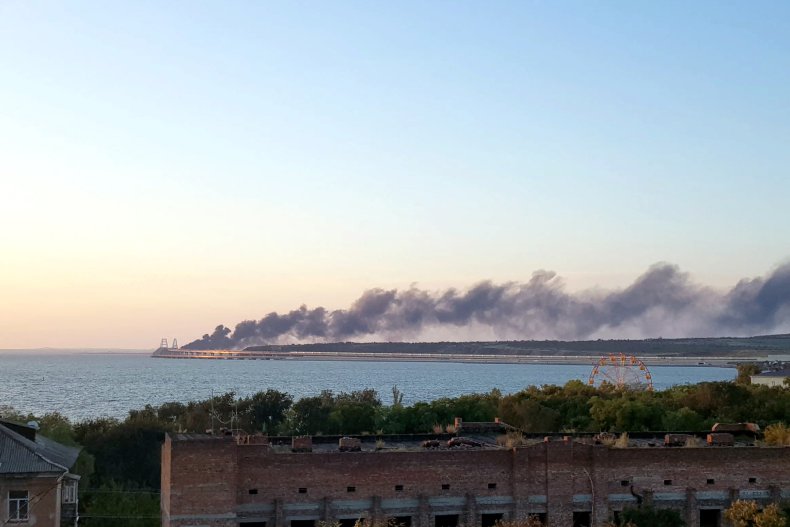Ukraine sees signs that Russian forces are preparing to abandon occupied Crimea if their positions become untenable, according to Kyiv's envoy responsible for the peninsula.
Tamila Tasheva—who since April 2022 has been President Volodymyr Zelensky's permanent representative for Crimea—told Newsweek in an interview that Kyiv has "noticed" signs of Russian nerves on the peninsula, which has been occupied since 2014 but is now under fire as Ukraine fights back Moscow's full-scale invasion of the rest of the country.
"Ukraine is actively preparing to bring Crimea and other occupied territories back, and the Russians see that," Tasheva said. "Since at least August, there have been strikes or sabotage on Russia's military and transport infrastructure, including the railway hub, or the Russian-held port, or the explosion on the Crimean bridge."
"These developments have forced them to redeploy their troops, vehicles and machinery to further inland and away from the frontlines. That tells us that they are expecting the situation to get worse, and they have to explain this to the local population too."

'Panic' on the Peninsula
"Their narrative has transformed from claims that 'we have powerful air defenses and will protect Crimea,' to scrambling to pacify the concerned locals that the explosions and shelling are either military drills, or accidents, and otherwise are 'nothing to worry about.'"
Kyiv has made clear its intentions to liberate Crimea, despite Western skepticism and fears that President Vladimir Putin may resort to nuclear weapons to retain control of the peninsula, which has become central to his neo-tsarist mythmaking.
To even reach Crimea, Kyiv's troops will have to fight through some 100 miles of heavily defended territory in occupied Ukraine. And to fully isolate the peninsula, Ukrainian forces would have to reach the Sea of Azov coast.
Regardless, recent satellite imagery shows that Russian forces are preparing for an assault on the peninsula. Trenches, strongpoints and anti-tank obstacles have been spotted lining the narrow approaches to Crimea, and on some beaches.
"Of course, Crimea remains an important military base for the Russians, they usually have about 35-37,000 officers and soldiers deployed there," Tasheva said. "But if you look at satellite images now, you can see that they are building fortifications along the western shore, possibly as a preventative measure against a possible amphibious landing."
"Many of the beaches there are closed for the public, there are huge traffic jams on the Kerch [Strait] bridge [which links the peninsula to the Russian mainland]—not just because of tourists going in, but also because many locals are fleeing, including native Russians. And the checkpoints they installed slow down the traffic even further, further signaling their concern about possible threats of infiltration and sabotage."
Though Russian tourists have flocked to the peninsula at the start of summer despite the war, missile and drone strikes on Crimean targets—suspected to be the work of Ukraine but which Kyiv routinely denies responsibility for—have also reportedly precipitated multiple waves of Russians fleeing the peninsula. Among them, Tasheva said, are the families of top collaboration officials.

"Armiansk, Dzhankoi and some other parts are particularly prone to this sort of panic, with our intelligence indicating that military members' and local officials' families are being evacuated from those parts," she said, referring to important settlements in the north of the peninsula.
"As far as we know, both Konstantinov's and Aksyonov's families are long gone from Crimea," Tasheva added, referring to Vladimir Konstantinov, the speaker of the Crimean parliament, and Sergei Aksyonov, the Kremlin-appointed head of the regional occupation authority. "There is some speculation that the latter family is not even in Russia," Tasheva added.
'They Have No Plan B'
The war is eroding the sense of security on the peninsula, undermining the Kremlin narrative that the 2014 annexation was intended to ensure stability and safety for Russian speakers there. Until February 2022, Russian-occupied Crimea was also grappling with water supply issues, the vital North Crimean Canal having been blocked by Ukraine in retaliation for Moscow's annexation.
The restoration of that water supply in the early days of the full-scale invasion was one of Russia's biggest initial victories. But the destruction of the Nova Kakhovka dam in June—which Kyiv has blamed on Russia, an accusation seemingly supported by the publicly available evidence—has imperiled that win.
The Nova Kakhovka reservoir—from which the North Crimean Canal draws its water—rapidly emptied, prompting Russian-aligned authorities to raise the alarm. Ukrainian and Russian officials have warned of the long-term devastation that could impact Crimean farming. Tasheva said Crimean reservoirs now only have enough water for three to five months of supply.
The "terrorist act and war crime" of the dam's destruction is already having "colossal" consequences, Tasheva said.

"The south of the country is the heart of its agricultural industry, which has already been badly hit. It significantly impacted our grain sales, including to the countries of the so-called 'Global South,' so the impact is already felt across the world."
"The local population has also been affected, including in terms of lacking access to drinking water. Ukraine has started rebuilding the water delivery systems and pipelines, but specifically for Crimea, the situation is dire."
"There is a dark irony in this too," Tasheva added, noting past Russian complaints that Ukraine's blocking of the canal constituted a "genocide of the Crimean people."
"For the longer term, they have no 'plan B,' Tasheva said of occupation officials. "Because there is no way to reinstate that supply in the near or medium term, or to build a new hydroelectric plant in Kakhovka. And there is no alternative source."
"They had for years discussed rerouting water from Russia, drilling Artesian wells—and draining what precious little groundwater reserves that they found—or building water purification plants. But none of those solutions have materialized or provided them with a sustainable water source. They just pillaged the funds dedicated to these projects by their government."
"That indicates to us that they are not in it for the long haul, and are simply exhausting the existing resources, which in itself is also extremely damaging to Crimea's environment and ecosystems."
Newsweek has contacted the Russian Foreign Ministry by email to request comment.

"control" - Google News
July 15, 2023 at 02:00PM
https://ift.tt/eklGPwz
Russian Forces 'Scrambling' To Keep Crimea Control: Kyiv Envoy - Newsweek
"control" - Google News
https://ift.tt/6C8ZA35
https://ift.tt/geczIAO
Bagikan Berita Ini














0 Response to "Russian Forces 'Scrambling' To Keep Crimea Control: Kyiv Envoy - Newsweek"
Post a Comment